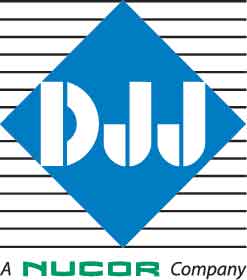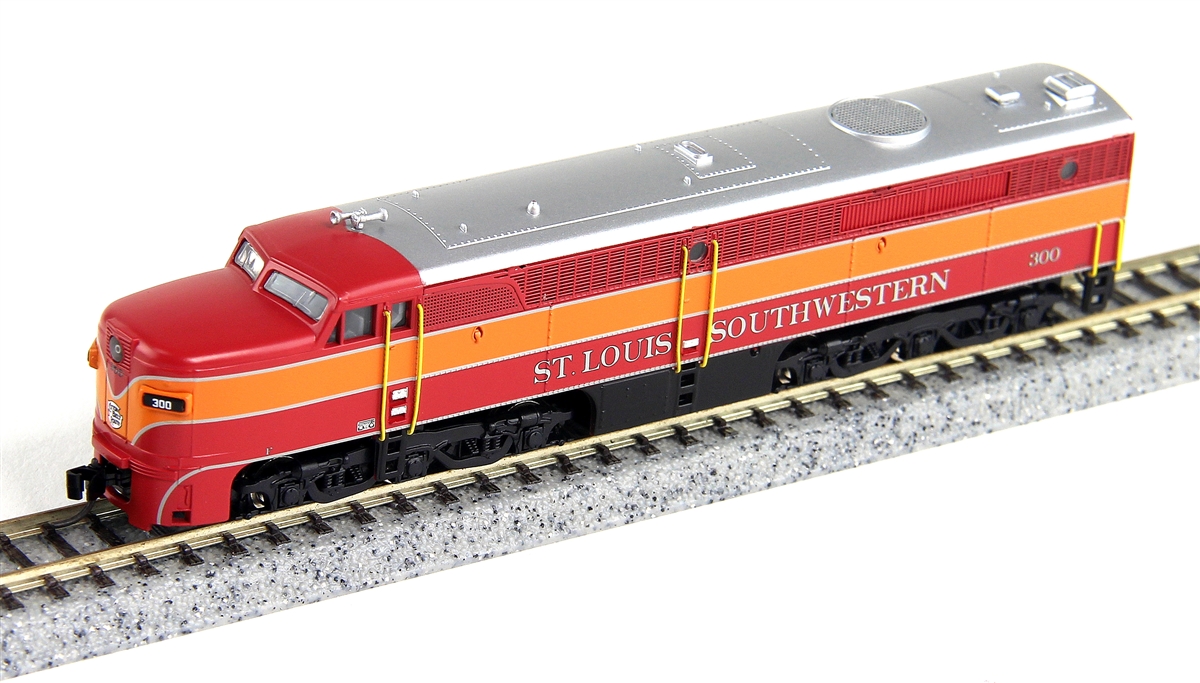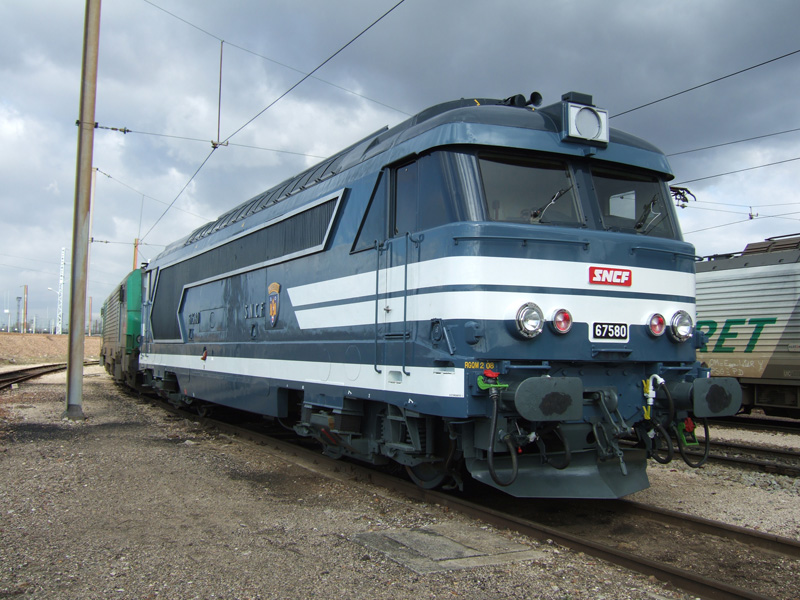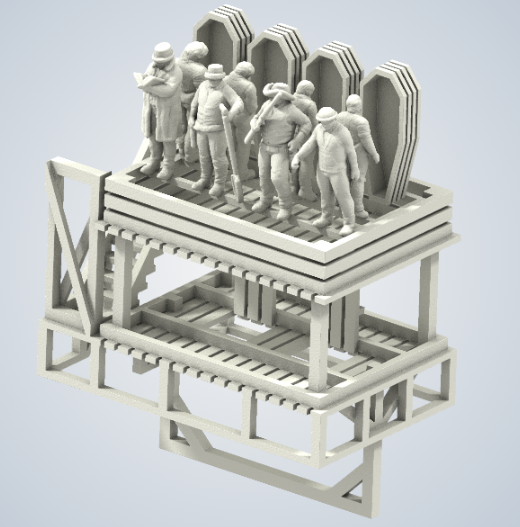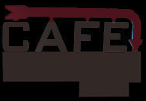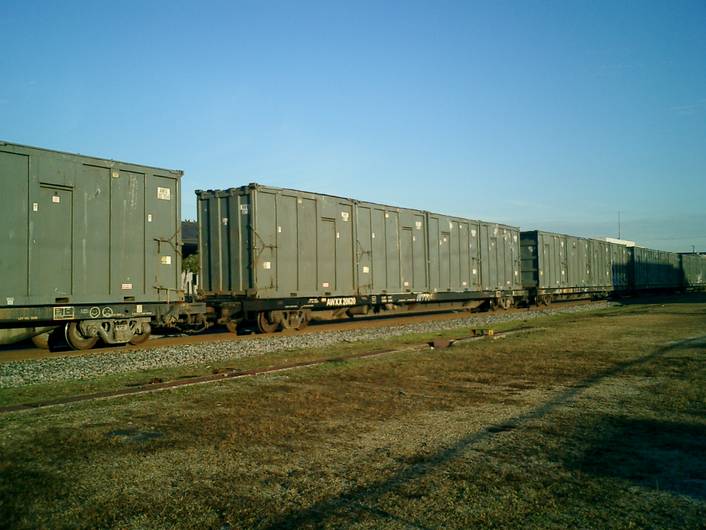Model Information: Introduced directly into the Atlas Trainman (Plus) line, this model first came out in 2011. It features a relatively simple design which allows Atlas to keep production costs low. It is nevertheless a very fine model with nice detail and printing. It won't run on tight curves but it looks great when loaded with Atlas trash containers. It features body-mount couplers and metal wheels making it a nice example of 3rd generation rolling stock design at a reasonable price.
Prototype History: A flatcar (US) (also flat car (US) or flat wagon (UIC)) is a piece of railroad (US) or railway (non-US) rolling stock that consists of an open, flat deck mounted on a pair of trucks (US) or bogies (UK), one at each end containing four or six wheels. Occasionally, flat cars designed to carry extra heavy or extra large loads are mounted on a pair (or rarely, more) of bogeys under each end . The deck of the car can be wood or steel, and the sides of the deck can include pockets for stakes or tie-down points to secure loads. Flatcars designed for carrying machinery have sliding chain assemblies recessed in the deck.
Flatcars are used for loads that are too large or cumbersome to load in enclosed cars such as boxcars. They are also often used to transport intermodal containers (shipping containers) or trailers as part of intermodal freight transport shipping.
COFC (Container On Flat Car) cars are typically 85' to 89' long and carry four 20' intermodal containers or two 40' shipping containers. With the rise of intermodal freight transport-specific well cars that allow double stacking, and given the age of most of these flats, numbers will decline over the next several years.
The 85' COFC flat are however still in use to transport MSW (Municipality Solid Waste) 20' containers.
Flatcars are used for loads that are too large or cumbersome to load in enclosed cars such as boxcars. They are also often used to transport intermodal containers (shipping containers) or trailers as part of intermodal freight transport shipping.
COFC (Container On Flat Car) cars are typically 85' to 89' long and carry four 20' intermodal containers or two 40' shipping containers. With the rise of intermodal freight transport-specific well cars that allow double stacking, and given the age of most of these flats, numbers will decline over the next several years.
The 85' COFC flat are however still in use to transport MSW (Municipality Solid Waste) 20' containers.
Road Name History: The David J. Joseph Company (DJJ), founded in 1885, one of the largest scrap metal recycling companies in the United States. The Joseph Company is headquartered in Cincinnati, Ohio and is a wholly-owned subsidiary of Nucor Corporation. We are not just a scrap trading and recycling company. DJJ brokers ferrous scrap, pig iron, HBI/DRI, and nonferrous metal scrap. We provide mill industrial logistics and rail services for steelmakers. We finance, buy, sell, and lease railcars and operate self-serve auto parts recycling retail stores. DJJ generates over $6 billion in sales each year. Incorporating wholly-owned and joint venture facilities, DJJ operates trading offices and recycling plants in 17 states and employs over 2,200 people. For more information on our Company, visit our web site at www.djj.com.
Brand/Importer Information: In 1924 Stephan Schaffan, Sr. founded the Atlas Tool Company in Newark, New Jersey. In 1933 his son, Stephan Schaffan, Jr., came to work for his father at the age of sixteen. Steve Jr. built model airplanes as a hobby and frequented a local hobby shop. Being an enterprising young man, he would often ask the owner if there was anything he could do to earn some extra spending money. Tired of listening to his requests, the hobby-store owner threw some model railroad track parts his way and said, "Here, see if you can improve on this".
In those days, railroad modelers had to assemble and build everything from scratch. Steve Jr. created a "switch kit" which sold so well, that the entire family worked on them in the basement at night, while doing business as usual in the machine shop during the day.
Subsequently, Steve Jr. engineered the stapling of rail to fiber track, along with inventing the first practical rail joiner and pre-assembled turnouts and flexible track. All of these products, and more, helped to popularize model railroading and assisted in the creation of a mass-market hobby. The budding entrepreneur quickly outgrew the limitations of a basement and small garage operation. Realizing they could actually make a living selling track and related products, Steve and his father had the first factory built in Hillside, New Jersey at 413 Florence Avenue in 1947. On September 30, 1949, the Atlas Tool Company was officially incorporated as a New Jersey company.
In 1985, Steve was honored posthumously for his inventions by the Model Railroad Industry Association and was inducted into the Model Railroad Industry Hall of Fame in Baltimore, Maryland. In addition, Steve was nominated and entered into the National Model Railroad Association Pioneers of Model Railroading in 1995.
In the early 1990s, the Atlas Tool Company changed its name to Atlas Model Railroad Company, Inc.
In those days, railroad modelers had to assemble and build everything from scratch. Steve Jr. created a "switch kit" which sold so well, that the entire family worked on them in the basement at night, while doing business as usual in the machine shop during the day.
Subsequently, Steve Jr. engineered the stapling of rail to fiber track, along with inventing the first practical rail joiner and pre-assembled turnouts and flexible track. All of these products, and more, helped to popularize model railroading and assisted in the creation of a mass-market hobby. The budding entrepreneur quickly outgrew the limitations of a basement and small garage operation. Realizing they could actually make a living selling track and related products, Steve and his father had the first factory built in Hillside, New Jersey at 413 Florence Avenue in 1947. On September 30, 1949, the Atlas Tool Company was officially incorporated as a New Jersey company.
In 1985, Steve was honored posthumously for his inventions by the Model Railroad Industry Association and was inducted into the Model Railroad Industry Hall of Fame in Baltimore, Maryland. In addition, Steve was nominated and entered into the National Model Railroad Association Pioneers of Model Railroading in 1995.
In the early 1990s, the Atlas Tool Company changed its name to Atlas Model Railroad Company, Inc.
Item created by: Bryan on 2016-06-12 16:16:18. Last edited by Alain LM on 2020-06-28 13:46:25
If you see errors or missing data in this entry, please feel free to log in and edit it. Anyone with a Gmail account can log in instantly.
If you see errors or missing data in this entry, please feel free to log in and edit it. Anyone with a Gmail account can log in instantly.




